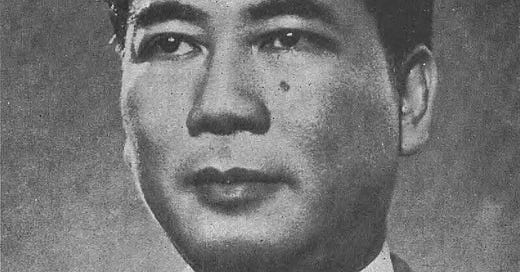Why Were We In Vietnam?
A family memoir sheds a great deal of light on this question. Also: How to save the American corporation.
Ngo Dinh Diem, our man in South Vietnam (until coup leaders killed him while we looked the other way).
I have a vivid childhood memory of sitting on a tall green chair in the small pantry between our kitchen and our breakfast room inside our family home in New Rochelle, New York. I was maybe 10 or 11, and I must have been talking to my mother. I don’t remember what she said. What I remember is sitting there and realizing, for the first time, that it was not impossible the Vietnam War would last so long that I’d be drafted to fight in it.
President Richard Nixon ended the draft shortly after my 15th birthday in 1973, and United States involvement in the Vietnam War was over. But the Vietnam War, and the United States’s disastrous involvement in it, still weighs on the minds of Baby Boomers—even those of us too young to have been affected in any direct way. It’s a cliché to say that the Vietnam War and the Watergate scandal created the cynicism about government that persists to this day, first on the left and subsequently on the right, where it curdled into QAnon and all the rest. But it’s true. You can draw a straight line from the Tet Offensive and the Smoking Gun tape to the 2016 election of Donald Trump (who received five Vietnam draft deferments).
For this reason, but of course not only this reason, the story of how the United States stumbled into Vietnam remains hugely important to understanding this country in 2024 (and also of course to understanding Vietnam). Charles Trueheart has written a remarkable book on this subject, Diplomats At War, that is also a family story—the story of the Kennedy family (which in this telling includes those who worked in President John F. Kennedy’s White House and State Department), the Diem family (South Vietnam’s rulers), the family of the Saigon ambassador, and Trueheart’ own family. It’s a significant work of history that reads like a novel. I reviewed it for The Washington Monthly. You can read the review here. Better still, read the book.
Also, my latest in The New Republic draws on another excellent book, The Vanishing American Corporation, by Gerald F. Davis of the University of Michigan Business School. Davis’s thesis is that corporations have lost the power to steer their own course and are reduced to being ATMs for Wall Street. A new study on the 2017 Trump corporate tax cut and the Fortune 500’s subsequent binge on stock buybacks and dividends provides ample evidence to support Davis’s view. The money these corporations lavished on stockholders exceeded not only their tax payments (by a factor of seven!) but also their profits. You can read that piece here.





Tim is 100% right about Charles Trueheart’s book. It’s excellent.
The Vietnam happened because a lot of people have no business getting involved in other people's affairs. Was the Vietnam war the result of the northern communist Vietnamese slowly taking over south Vietnam and then there was tragic burning of a monk opposed to a corrupted Catholic government regime and leader... Were these the reasons for America to go to war ?
The war ended with over 58,000 of my buddies ending up on that wall in Washington and over 3 million Vietnamese killed .and we dropped more than 3 times the armaments on Vietnam than we did on all that destruction on Europe in world war two ..
I remember listening to Madam Diem coming to America with her beautiful daughter addressing a class at Harvard University in the early 60's saying ,
"Please stay out of our country you are only making things worse . We can take care of things ,, the more you do they more we have problems ,,go home , please go home ," so there you have it ,JFK reluctantly sending adviser, and soon LBJ faking a Vietnam attack on American ships in the Gulf of Tomkin .the Vietnam War
50 years later Vietnam is a communist country,, walk in any retail store in America and you will find good products made in and from Vietnam.
To this day I remember,',please stay out of our country,, go home ,, go home ." .and now I think how those 58,000+ guys on that wall would have made our lives a lot better and different.
Vietnam Veteran 1966-69